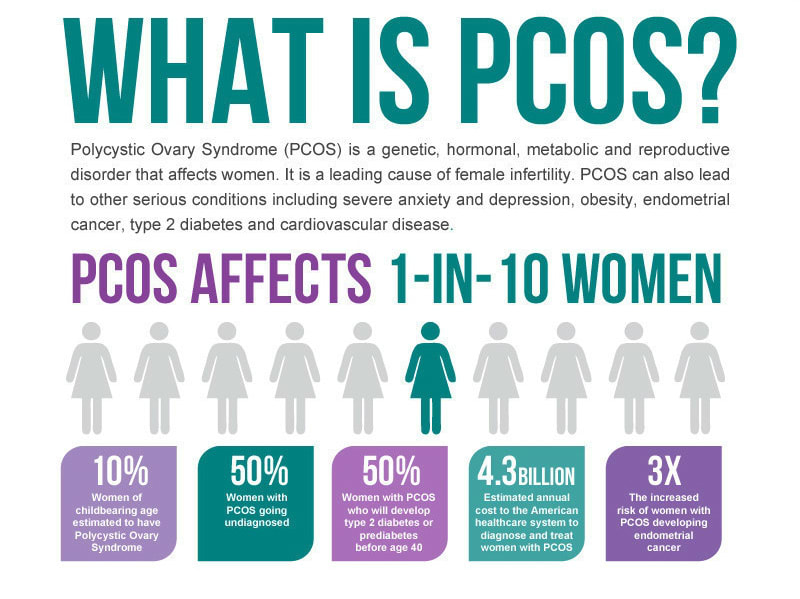|
|
Post by ronni on Jan 27, 2019 12:29:58 GMT
Polycystic ovary syndrome (PCOS) is a condition that causes hormonal imbalances and problems with metabolism. Research has found that what people eat has a significant effect on PCOS. A healthful PCOS diet should include the following foods: natural, unprocessed foods high-fiber foods fatty fish, including salmon, tuna, sardines, and mackerel kale, spinach, and other dark, leafy greens dark red fruits, such as red grapes, blueberries, blackberries, and cherries broccoli and cauliflower dried beans, lentils, and other legumes healthful fats, such as olive oil, as well as avocados and coconuts nuts, including pine nuts, walnuts, almonds, and pistachios dark chocolate in moderation spices, such as turmeric and cinnamon In general, people on a PCOS diet should avoid foods already widely seen as unhealthful. These include: Refined carbohydrates, such as mass-produced pastries and white bread. Fried foods, such as fast food. Sugary beverages, such as sodas and energy drinks. Processed meats, such as hot dogs, sausages, and luncheon meats. Solid fats, including margarine, shortening, and lard. Excess red meat, such as steaks, hamburgers, and pork. Info found on www.medicalnewstoday.com/ |
|
|
|
Post by asta on Apr 1, 2019 22:41:40 GMT
Around 50 percent of women with the disorder are overweight or obese.
Common symptoms include
acne
hirsutism (excessive hairiness)
male pattern baldness
Women with PCOS, particularly when its symptoms are not managed, may also be at greater risk for
heart disease
endometrial cancer
diabetes
high blood pressure
So an optimal diet is essential to eliminate or at least reduce the symptoms and risks.
|
|
|
|
Post by ronni on Jul 12, 2019 23:29:31 GMT
Women with PCOS may have lower numbers of beneficial gut bacteria. Eating foods rich in probiotics or taking a probiotic supplement may support your gut bacteria, thus aiding weight loss.
|
|
|
|
Post by asta on Jul 21, 2019 0:34:37 GMT
A low-GI diet can help restore irregular periods, reduce inflammatory markers and improve insulin sensitivity in women with PCOS.
|
|
|
|
Post by ronni on Dec 11, 2019 0:07:11 GMT
PCOS can impact up to 7% of adult women.
The hormonal imbalances, insulin resistance and inflammation related to this condition make it difficult for women with PCOS to shed weight.
Lowering your carb consumption may help manage PCOS due to carbs’ impact on insulin levels.
|
|
|
|
Post by asta on Feb 17, 2020 1:34:16 GMT
Women with PCOS are encouraged to eat regular meals.
A study found that making breakfast the biggest meal and dinner the smallest may help balance out the hormones associated with PCOS.
For normal-weight women with PCOS, eating almost half of their daily calories at breakfast reduced insulin levels by 8% and testosterone levels by 50% over 90 days.
In addition, these women ovulated 30% more often than women who ate a smaller breakfast and larger dinner, suggesting improved fertility.
However, it’s important to note that increasing the size of your breakfast without reducing the size of your evening meal is likely to lead to weight gain.
|
|
|
|
Post by ronni on Apr 10, 2020 23:03:04 GMT
The low-carb ketogenic diet is everywhere lately, and you may be wondering if it’s good or bad for PCOS. Since it limits carbohydrate intake, which will limit stimulation of insulin secretion, it may have some benefits when it comes to helping women with polycystic ovary syndrome: In small, preliminary studies of women with PCOS, a keto diet has been shown to improve hormone ratios and fertility.
However, you'll need to pay attention to the fats you're eating if you choose to follow a keto diet for PCOS. Some ketogenic diets will not specifically limit 'bad fats' or specify healthier, plant-based unsaturated fats.
|
|
|
|
Post by asta on Aug 7, 2020 22:12:39 GMT
High-fiber foods can help combat insulin resistance by slowing down digestion and reducing the impact of sugar on the blood. This may be beneficial to women with PCOS. Great options for high-fiber foods include: cruciferous vegetables, such as broccoli, cauliflower and Brussels sprouts greens, including red leaf lettuce and arugula green and red peppers beans and lentils almonds berries sweet potatoes winter squash pumpkin |
|
|
|
Post by ronni on Oct 6, 2020 22:57:48 GMT
Almost without exception, all of the success stories from the PCOS Diet come from women that have tried a lot of other diets before finally discovering that the PCOS Diet is a unique beast.
While we can draw on the healthy influences of the Mediterranean Diet, Whole30 and Paleo recipes, none of these are perfectly synonymous with the type of diet that works best for PCOS.
|
|
|
|
Post by asta on Oct 14, 2020 22:14:09 GMT
PCOS Diet testimonial "I started to research what clean eating truly meant and slowly implemented what I learned about eating whole, nutritious foods. I lost approximately 60 lbs just by exercising 5-6 days a week and watching what I ate. I became good friends with a personal trainer, who helped me shed another 70 lbs (total of 130 + lbs.) Since then, I have started to do 99% of my workouts at home as I am a busy nurse, mom and coach. I have fluctuated up and down since that point by a few pounds here and there, but I now know that it is always possible to lose weight with a little determination and support of others." -Maria  |
|